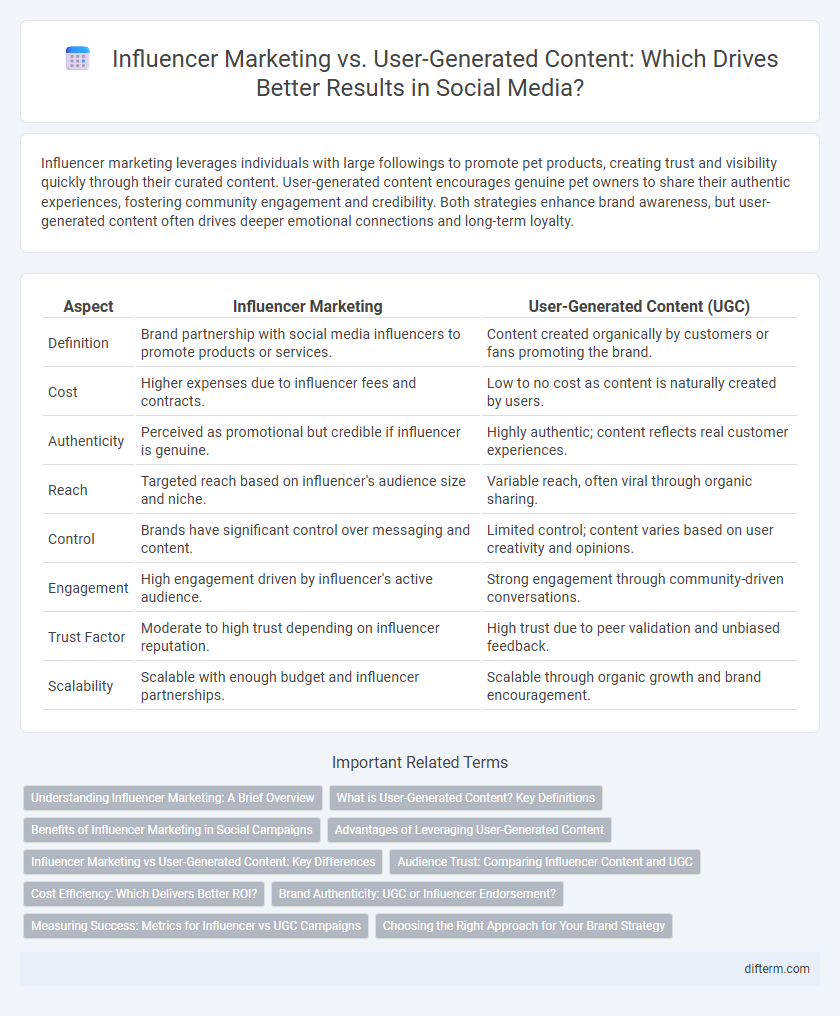Influencer marketing leverages individuals with large followings to promote pet products, creating trust and visibility quickly through their curated content. User-generated content encourages genuine pet owners to share their authentic experiences, fostering community engagement and credibility. Both strategies enhance brand awareness, but user-generated content often drives deeper emotional connections and long-term loyalty.
Table of Comparison
| Aspect | Influencer Marketing | User-Generated Content (UGC) |
|---|---|---|
| Definition | Brand partnership with social media influencers to promote products or services. | Content created organically by customers or fans promoting the brand. |
| Cost | Higher expenses due to influencer fees and contracts. | Low to no cost as content is naturally created by users. |
| Authenticity | Perceived as promotional but credible if influencer is genuine. | Highly authentic; content reflects real customer experiences. |
| Reach | Targeted reach based on influencer's audience size and niche. | Variable reach, often viral through organic sharing. |
| Control | Brands have significant control over messaging and content. | Limited control; content varies based on user creativity and opinions. |
| Engagement | High engagement driven by influencer's active audience. | Strong engagement through community-driven conversations. |
| Trust Factor | Moderate to high trust depending on influencer reputation. | High trust due to peer validation and unbiased feedback. |
| Scalability | Scalable with enough budget and influencer partnerships. | Scalable through organic growth and brand encouragement. |
Understanding Influencer Marketing: A Brief Overview
Influencer marketing leverages individuals with large, engaged followings to promote brands, creating authentic connections that drive consumer trust. It involves strategic partnerships where influencers create tailored content that resonates with their audience, enhancing brand visibility and credibility. Compared to user-generated content, influencer marketing offers controlled messaging through vetted personalities, ensuring alignment with brand values and marketing goals.
What is User-Generated Content? Key Definitions
User-generated content (UGC) refers to authentic, unpaid material created and shared by consumers or fans about a brand, product, or service, including reviews, photos, videos, and social media posts. Unlike influencer marketing, which involves paid endorsements from individuals with large followings, UGC emphasizes genuine user experiences that foster trust and engagement through organic community contributions. Key definitions highlight UGC as a powerful tool for building social proof and enhancing brand credibility by leveraging real customer voices.
Benefits of Influencer Marketing in Social Campaigns
Influencer marketing drives higher engagement rates and brand credibility by leveraging trusted personalities with loyal followings, resulting in increased conversions and customer trust. It offers precise targeting capabilities through niche influencers, ensuring campaigns reach relevant audiences effectively. Brands benefit from scalable content creation and authentic storytelling, which amplify social media presence and boost overall campaign ROI.
Advantages of Leveraging User-Generated Content
User-generated content (UGC) enhances brand authenticity by showcasing real customer experiences, which boosts trust and engagement more effectively than traditional influencer marketing. UGC drives higher conversion rates as potential customers relate better to genuine peer reviews and organic storytelling. Brands benefit from cost-effective content creation and diverse perspectives that continuously fuel social proof across multiple platforms.
Influencer Marketing vs User-Generated Content: Key Differences
Influencer marketing leverages partnerships with individuals who have established credibility and large followings to promote brands, driving targeted engagement and trust through curated content. User-generated content (UGC) relies on authentic customer-created posts that foster organic community interaction and enhance brand authenticity without direct compensation. While influencer marketing ensures controlled messaging and broader reach, UGC amplifies genuine consumer voices and cost-effective brand advocacy.
Audience Trust: Comparing Influencer Content and UGC
Audience trust in influencer marketing often stems from perceived expertise and curated content, leading to higher initial engagement rates. User-generated content (UGC) typically fosters deeper trust through authenticity and relatable experiences shared by real customers. Brands leveraging UGC benefit from enhanced credibility and grassroots community building, which can outperform influencer campaigns in long-term trust development.
Cost Efficiency: Which Delivers Better ROI?
Influencer marketing often requires substantial investment but can deliver targeted reach and higher engagement rates, enhancing ROI for brand awareness campaigns. User-generated content (UGC) significantly reduces costs by leveraging authentic consumer experiences, resulting in increased trust and organic promotion at scale. Brands focusing on long-term community building generally achieve better cost efficiency and ROI through strategically integrated UGC efforts.
Brand Authenticity: UGC or Influencer Endorsement?
User-generated content (UGC) drives brand authenticity by showcasing genuine customer experiences, fostering trust through relatable and unfiltered narratives. Influencer endorsements often leverage credibility and reach but risk perceived inauthenticity if content feels overly scripted or promotional. Brands that integrate UGC with carefully selected influencers achieve a balanced approach, enhancing authenticity and engagement in social marketing campaigns.
Measuring Success: Metrics for Influencer vs UGC Campaigns
Measuring success in influencer marketing campaigns often relies on metrics such as engagement rate, follower growth, click-through rate, and conversion tracking linked to the influencer's content. User-generated content (UGC) campaigns emphasize metrics including the volume of content created, brand mentions, sentiment analysis, and organic reach to evaluate authenticity and community impact. Brands optimize ROI by comparing influencer-driven performance metrics with UGC engagement trends to tailor social strategies effectively.
Choosing the Right Approach for Your Brand Strategy
Influencer marketing leverages established personalities to rapidly expand brand reach and credibility through targeted campaigns, while user-generated content (UGC) fosters authentic engagement by encouraging customers to share genuine experiences. Brands seeking immediate visibility and influencer association benefit from influencer partnerships, whereas those aiming for community trust and organic growth should prioritize UGC initiatives. An optimal brand strategy often combines influencer promotion with UGC to balance authenticity and broad exposure.
influencer marketing vs user-generated content Infographic

 difterm.com
difterm.com